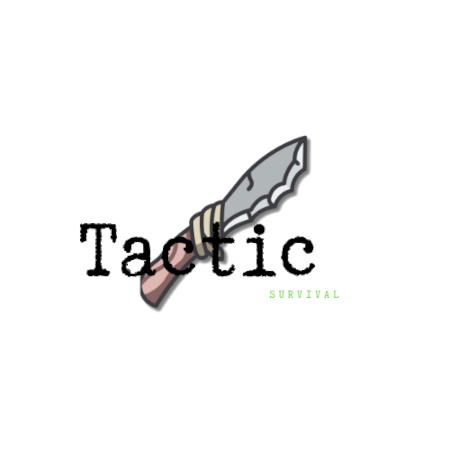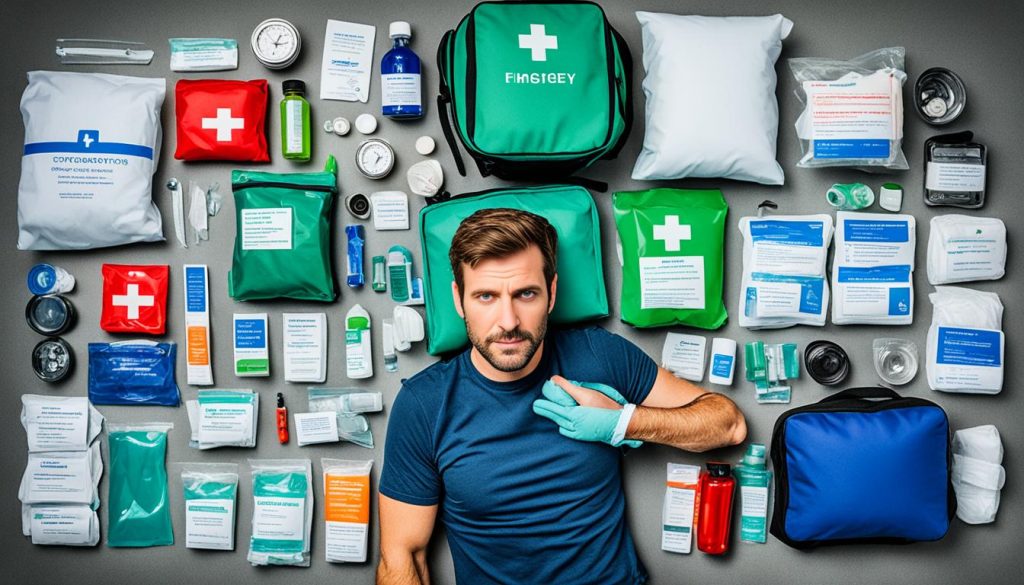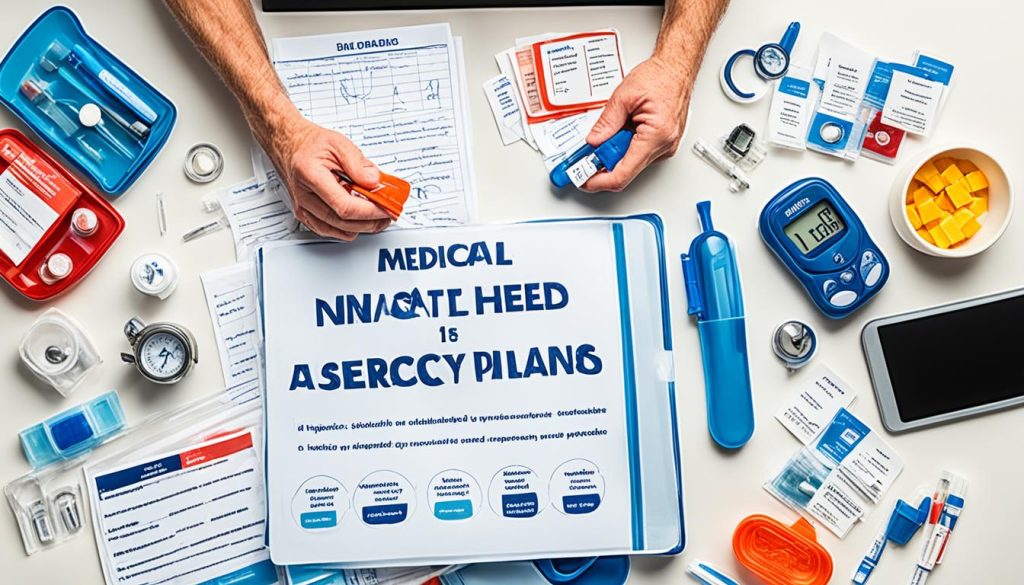Do you know that millions of people worldwide struggle with chronic illnesses every day?
When natural disasters or emergencies hit, these individuals face huge obstacles. It’s particularly hard for them because their health issues are long-term. To stay healthy during emergencies, they must be ready and make sure they take the right steps.
Key Takeaways:
- Managing chronic conditions during emergencies requires careful planning and preparation.
- Creating a disaster supply kit, ensuring an adequate supply of medications and medical supplies, and safeguarding important documents are crucial steps for staying prepared.
- Different age groups and specific chronic diseases may have unique needs and considerations for emergency preparedness.
- Stress management, seeking emotional support, and practicing self-care activities are essential coping strategies for managing chronic conditions during emergencies.
- By prioritizing emergency preparedness and implementing the right strategies, individuals can effectively manage their chronic conditions and ensure their well-being during times of crisis.
Top Three Tips for Staying Prepared
Being ready is vital when you have a chronic condition during emergencies. Here are the top three tips to help you stay safe and well:
- Create a Disaster Supply Kit
- Ensure an Adequate Supply of Medications and Medical Supplies
- Safeguard Important Documents and Medical Records
Create a Disaster Supply Kit
Your disaster supply kit must suit your needs if you have a chronic illness. Don’t forget to include:
- Non-perishable food and water
- Prescription medications
- Over-the-counter medications
- Medical supplies (e.g., bandages, syringes)
- Flashlights and batteries
- Important documents (e.g., identification, health insurance)
A complete disaster supply kit ensures you’re ready to handle your health situation during crises.
Ensure an Adequate Supply of Medications and Medical Supplies
For those battling chronic conditions, consistent access to medicine and supplies is crucial. Here’s what you should do:
Talk to your doctor about getting extra medicine. Plan for larger refills or emergency supplies.
Always check when your medicines expire. Keep your supplies up to date.
Add medical items, like extra test strips or inhalers, to your kit.
Having enough medicine and supplies helps you deal with your health issue better in emergencies.
Safeguard Important Documents and Medical Records
It’s key to keep your important papers and records safe during tough times. Take these steps to protect them:
- Make copies of important papers and keep them in a safe place or save them on a secure device.
- Carry a card with your medical basics like conditions, medicines, and allergies. Keep it with you always.
- Consider a waterproof, fireproof place for your documents or use a safe online storage.
By protecting your documents and records, you make sure you can get key information when you need it most.
Following these tips can make a big difference for those with chronic conditions. Planning ahead for emergencies helps manage your illness better. This leads to staying healthier and feeling more secure.
Preparedness by Age Group
For managing chronic conditions in emergencies, each age group has special needs. Older adults, infants, and new parents may need to prepare differently. This ensures their health and well-being during crises.
Older adults, with many chronic conditions, need a strong support network. They should also have an emergency kit with medications and medical tools. Sharing their health info and plans with caregivers or doctors is key too.
“During emergencies, older adults may find it hard to get healthcare and their medicines. They must have a detailed emergency plan that meets their unique needs.” – Dr. Sarah Thompson, Geriatric Specialist
Infants need their parents or caregivers for everything. Parents should add baby items in their emergency kits, like formula and diapers. They need to know where to find special care for infants.
Expectant and new parents have even more to think about. They should prepare a bag for the baby and keep medical documents handy. Having a support system, like a caregiver, is crucial too.
Essential Preparedness Measures by Age Group
| Age Group | Preparedness Measures |
|---|---|
| Older Adults |
|
| Infants |
|
| Expectant and New Parents |
|
Understanding what each age group needs helps everyone be ready for emergencies. This keeps both individuals and their families safe.
Preparedness by Chronic Disease
During emergencies, managing chronic diseases is crucial. Each condition requires special preparedness. Individuals with diseases like Alzheimer’s, arthritis, cancer, and diabetes must think about their unique needs for emergencies.
To stay safe, it’s important to have a plan for each disease. This plan helps affected individuals deal with their condition during crises.
Alzheimer’s Disease
For those with Alzheimer’s, a familiar routine is key. Emergency plans should aim to avoid changes and keep the environment safe. Caregivers need to keep a list of contacts and medical info handy.
Arthritis
Arthritis issues can be reduced with proper planning. Consider aids like joint protection and medications. It’s a good idea to have a support network ready for help with daily activities.
Cancer
Cancer patients need to plan for essential meds and care access. Talking with doctors is important for emergency strategies and treatment plans. Think about how to get to treatment if normal means are blocked.
Diabetes
Diabetics must get ready for emergencies. Stock up on insulin, test kits, and medications. Add diabetes-friendly foods to your emergency kit, and remember local assistance is available.
Epilepsy
Epilepsy prep includes having enough meds and seizure tools. Make a plan with doctors for seizure care. Also, teach those around you how to help if you have a seizure.
Heart Disease
Heart disease prep focuses on meds and a heart-healthy diet. Keep a low-salt, low-fat emergency diet on hand. Always watch for symptoms and get help if you need it.
Kidney Disease
For kidney disease, have extra meds and dialysis supplies ready. Plan for where to get dialysis if your usual place isn’t available. Your emergency kit should include fluids and kidney-friendly foods.
Addressing disease-specific needs is key to emergency preparedness. Being proactive about healthcare, meds, and support improves safety for those with chronic illnesses.
Tips for Specific Chronic Diseases
Each chronic disease has its own set of difficulties during emergencies. People with diseases like Alzheimer’s, arthritis, cancer, and others need to be extra prepared. They should know what steps to take to stay safe and healthy when a disaster strikes.
Tips for Alzheimer’s Disease:
- Create a detailed emergency action plan that includes important contact information and medical records.
- Ensure a sufficient supply of medications, including any memory aids or assistive devices.
- Consider enrolling in a local Alzheimer’s Association Safe Return program for additional support.
Tips for Arthritis:
- Keep your necessary medicines and devices easy to get during an emergency.
- Use either heat or cold therapy to help with pain as needed.
- Stay active in ways that won’t hurt your joints too badly.
Tips for Cancer:
- Work with your medical team to make sure you have enough medicine and treatment options ready.
- Keep in contact with your doctor or clinic to get updates and advice.
- Think about possible treatment side effects and plan how to handle them.
Tips for COPD:
- Make an emergency plan that includes your meds, extra oxygen, and a way to power your devices.
- Try to avoid breathing in smoke or dust if you can.
- Ask your doctor how you should adjust your care in an emergency.
Tips for Diabetes:
- Have enough insulin, blood sugar testers, and diabetes care stuff on hand.
- Keep non-perishable food in your kit for managing your blood sugar.
- Check your blood sugar often and tweak your medicine as your doctor advises.
Tips for Epilepsy:
- Carry something that shows you have epilepsy and lists who to contact in an emergency.
- Try your best to sleep and wake up at regular times to help prevent seizures.
- Keep your meds where you can easily find them in an emergency.
Tips for Heart Disease:
- Make a plan for emergencies that includes your meds, ways to manage your symptoms, and key contacts.
- Don’t do too much physical work or get too stressed during an emergency.
- Check your blood pressure often and ask your heart doctor for advice.
Tips for Kidney Disease:
- Have plenty of your necessary meds on hand, especially those for blood pressure and kidney function.
- Drink enough water and cut down on salt to help your body balance fluids well.
- Talk to your kidney doctor or healthcare team about how to care for your kidneys in an emergency.
Impact of Natural Disasters on Chronic Conditions
Natural disasters really affect people with chronic conditions. They make existing health problems worse and disrupt daily life. This puts those managing long-term health issues at more risk and makes it harder for them.
During disasters, it’s tough to get the medical care and supplies you need. For example, people with Alzheimer’s may get more anxious because their usual routine is disrupted.
People with arthritis have to plan ahead so they can move easily in emergencies. Not being able to move or get their meds can make their symptoms worse. This might lower their quality of life.
Cancer patients need to watch out for infections because their immune system is weak. Quick medical help is vital to avoid problems and get treatment on time.
People with COPD should plan for how they’ll get oxygen therapy if needed. Bad air from smoke or dust can make their breathing problems worse.
Diabetes patients must protect their insulin and check their feet often. Changes in routine and hard access to medicine can cause issues like infections or worse.
Epileptic people should have a 3-day supply of their meds and teach others how to help if they have a seizure. Stress and changes in medicine can up the chances of having a seizure. So, being ready is key.
Heart disease patients should keep an eye on their blood pressure and know the signs of a heart attack or stroke. Injuries can happen and health might get worse during tough times.
Kidney disease patients need to know where the nearest dialysis centers are. They should also have a diet for emergencies. This is vital to continue their treatments and stay healthy.
It’s also vital to consider how natural disaster conditions, like smoke and pollution, can harm health. This is especially true for those with heart problems.
Overall, it’s very important for people with chronic health issues to get ready and be smart in disasters. Knowing the dangers, being prepared, and following specific health advice are key. This way, they can stay safe and look after their health better.
Coping Strategies for Managing Chronic Conditions during Emergencies
Managing chronic conditions during emergencies can seem like a lot. That’s why having good coping strategies is key. They help you take care of yourself better.
1. Stress Management: Chronic illnesses and emergencies bring a lot of stress. To handle it, find stress-busting methods that suit you. Deep breathing, meditation, or yoga can really help. Taking part in activities you love can reduce your stress too. This enhances your well-being and helps you cope with your condition in tough times.
2. Self-care: Looking after yourself becomes even more crucial. Focus on eating well, sleeping enough, and moving your body when possible. This boosts both your physical and mental health. It keeps you steady in managing your condition, even when things are hard.
3. Emotional Support: It’s vital to have people around who get what you’re going through. Talk to friends, family, or join a support group. Sharing your thoughts with others can bring great comfort. You can also look for online support or call helplines for help.
Everyone’s coping methods are different. It’s vital to try different strategies to see what works for you. By handling stress, focusing on self-care, and talking to those who support you, you can get through tough times with your condition.
Conclusion
People with chronic conditions must get ready for emergencies and manage their health well in crises. With a solid plan that includes a kit, enough medicines, and important papers, they can stay safe. No one should be caught off guard.
It’s also key to handle stress and emotions when health problems come up suddenly. Ways to do this are through stress relief, talking with others, and making time for yourself. Doing this, they can keep their health in check and face hard times proactively.
Tackling chronic illnesses in tough times needs a mix of readiness and calm spread. By making these parts of life, individuals can stay mentally strong and healthy in crises. Always put your health first and be ready to manage your chronic illnesses even in the worst situations.


